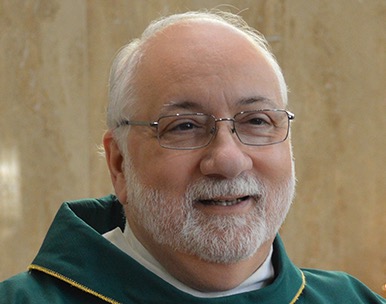A Revelation of Love
Entering Thanksgiving and Christmas with prayerful intentionality
Deacon Dominic Cerrato Comments Off on A Revelation of Love
 Sometimes two things seem to come together that, from all outward appearances, have almost nothing to do with one another. Take, for example, Thanksgiving and Christmas. To be sure, they occur near the same time of year, but for very different reasons; one to commemorate the pilgrims’ gratitude to God who saw them through a difficult winter, and the other for the gift of God in Jesus Christ.
Sometimes two things seem to come together that, from all outward appearances, have almost nothing to do with one another. Take, for example, Thanksgiving and Christmas. To be sure, they occur near the same time of year, but for very different reasons; one to commemorate the pilgrims’ gratitude to God who saw them through a difficult winter, and the other for the gift of God in Jesus Christ.
In both cases, what is at the core of these holidays is God, albeit from different perspectives with different intensities. In the case of Thanksgiving, it was something that God gave the pilgrims to survive harsh conditions in a foreign land, and in the case of Christmas, it was God himself in Christ Jesus.
Thought of this way, Thanksgiving and Christmas form a natural progression of sorts. One reveals divine providence, and in the other, the one whose providence is divine. In each case, and in their own way, they are meant to be ways in which we encounter and re-encounter Our Lord by entering into these holidays with prayerful intentionality.
With respect to our diaconate, the progression found from Thanksgiving to Christmas can be both instructive and inspiring. This is particularly true when we reflect on how a gift, given in genuine love, reveals the giver.
When we give a gift to someone we love, we do so with great care as it represents a token of our relationship. The more intimate the relationship, the more intimate the gift. Thus, for example, when we court another, we may give gifts such as flowers and chocolate. As the relationship increases in intimacy, the gifts become more precious. At some point, it may progress to include an engagement ring that signifies an even deeper gift to come, the exchange of self at the altar.
Likewise, Thanksgiving and Christmas, though celebrated chronologically out of order (Christmas came first) reveal nonetheless, a kind of order of progression. God gives us something, such as the Law of the Old Testament, and then, as the relationship increases in intimacy on our part, he gives himself — first through the Incarnation, and then through his passion, death and resurrection.
This progression has broad applications in the Christian life and, in particular, to those called to ecclesial service through the diaconate.
Initially, we might be tempted to view the exercise of our ministry as “gifts” we give others, as things we do for their sake. While this is certainly true, it is the first truth in a progression that, with grace, reveals an even greater truth. Diaconal ministry is not simply something we give, things we do, but someone we give, our very selves. This imbues our ministry with a Christocentric quality because it enables us to incarnate, in ourselves, Christ the Servant, the very one to whom we were configured on the day of our ordination.
As we celebrate these holidays, let us intentionally and prayerfully reflect upon their meaning not only for the whole of Christianity but for our diaconate as well. Indeed, as we rejoice in the gift we’ve received at baptism and ordination, let us be filled with such gratitude that we give thanks (Thanksgiving) such that we incarnate the living God revealing him in our presence (Christmas).
May you and your families have a blessed Thanksgiving and a joyous Christmas.
DEACON DOMINIC CERRATO, Ph.D., is editor of The Deacon and director of diaconal formation for the Diocese of Joliet, Illinois. He is the founder of Diaconal Ministries, where he gives national presentations and retreats to deacons and diaconal candidates. Follow him on Facebook to continue the conversation.





